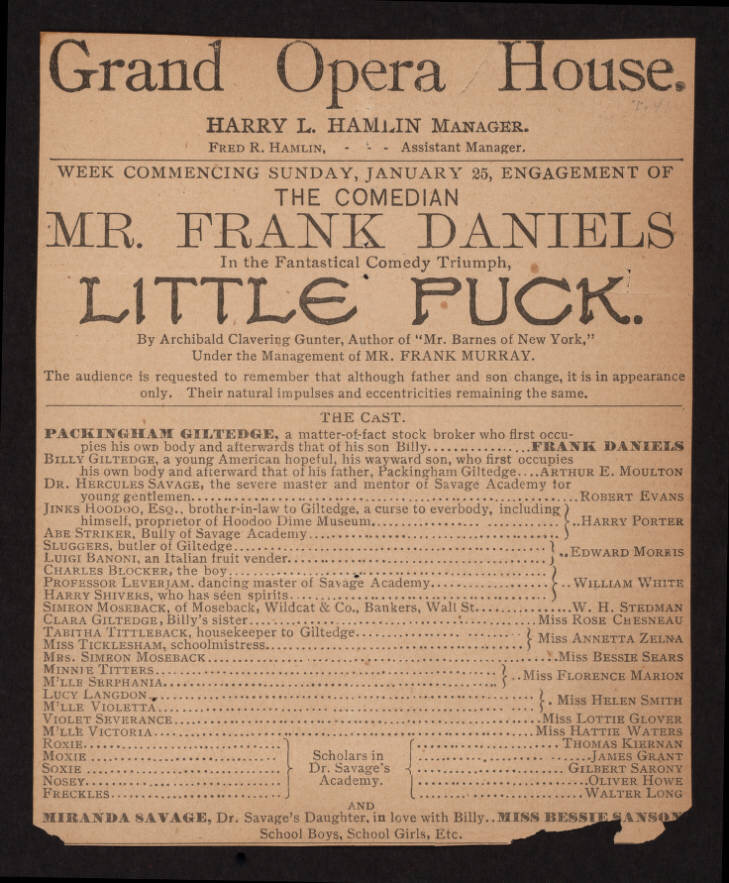9 March 2021; minor update: 21 April 2021
A jinx is a person or thing that carries bad luck with it. The origin of the Americanism is not quite certain, but it most likely comes from the name of a character in a very popular play at the turn of the twentieth century. The major dictionaries, however, all give tentative etymologies relating to the bird known as the wryneck or jynx because of its use in magic and casting spells. But the avian etymology has significant problems, and there is a clear trail of lexical evidence leading from the play to the word jinx that has been uncovered by researcher Douglas Wilson.
The play is Little Puck, produced by and starring comic actor Frank Daniels and written by Archibald C. Gunter. It debuted in New York in 1888 and, although today it is all but forgotten, it was tremendously successful, with touring companies and revivals throughout the United States of the next two decades. Among the cast of characters was this role, originally played by actor Harry Mack:
Jinks Hoodoo, esq. a curse to everybody.....Harry Mack
During the late nineteenth and early twentieth centuries, Jinks was commonly used as the name of comical characters in theater and in jokes. And hoodoo, a variation on voodoo, was in use as a bringer or run of bad luck by 1882. Audiences of the day would instantly recognize a character named Jinks Hoodoo as a comical bringer of bad luck. And over the years, the meaning of hoodoo would shift onto the first element, jinks.
Jinks Hoodoo quickly caught on as a nickname for someone who brought bad luck. For example, an account in the Hawaiian Gazette with a dateline of 4 March 1895 tells of a “very nervous” passenger traveling on the steamer Australia bound for San Francisco who was certain the ship would sink before reaching port:
The officers of the vessel found that smoke was issuing from the main hatch. The supposition was that the coal was on fire, but happily it turned out that “back smoke” from the funnel was the cause of the trouble. But few of the passengers knew anything of the matter until it was over. At the time the smoke was discovered most of the male passengers were in the smoking room trying to “do” one another out of a dollar at the classic games of “cinch” When they heard of the ship’s escape the winners were glad and the losers declared that Mr. Ficke was a genuine “Jinks Hoodoo.”
And the Nevada State Journal of 4 April 1906 has this about Duncan B. Harrison, veteran of the Spanish-American War, dramatist, and actor, but who, as far as I can tell, had no connection with the play Little Puck—when the article says he is the only original, it means that misfortune has long dogged him, not that he played the part in the play’s debut:
Harrison is evidently a child of misfortune. He seems to be the only original “Jinks Hoodoo.” Wherever there is a brick house to fall, Harrison is there to furnish a cushion, but not to tumble. Wherever there is a cloudburst, Harrison does the wet-dog act. He probably owns an umbrella, but, whether he does or not you are going to find him under the downpour, whenever it rains.
The clipping and respelling to jinx appeared at just about this time. The word seems to have been a favorite of one or more sportswriters for the San Jose, California Evening News. There is this from 3 November 1906, which intriguingly uses jinx as a carrier of good luck:
Manager Mayer has hurled as startling defi at Danny Shay, the Stockton captain, stating that the latter can secure any baseball players in the world to play with his team. So confident has been Mayer’s tone that Shay and Moreing, the guiding stars of Stockton baseballdom, have lost their faith in their baseball Jinx.
And a few days later on 9 November 1906, the Evening News had this:
Mayer will carry along a Jinx with him for good luck.
At the beginning of the next season, on 4 May 1907, the paper ran this:
San Jose has a team of which she may well be proud this season. Not once have they been in danger of losing the coveted position at the head of the procession. The Jinx is certainly with the locals this year. Artie Mayer, son of Manager E. P. Mayer, is the mascot of the team, and he seems to have brought good luck to the San Jose club.
By mid-season, however, the San Jose team’s luck had changed, and the Evening News ran this article:
The Jinx that has been clinging onto the San Jose club for several weeks, was given the run Sunday afternoon, when the locals defeated the San Francisco team of the California League by a score of 5 to 3.
Over the next few years, other sportswriters picked up the word, but used it in the Jinks Hoodoo sense of bad luck. And by 1912 the sports pages of America’s newspapers are filled with jinxes.
The Oxford English Dictionary, in an entry from 1933, says jinx is “apparently” from jynx, an alternative name for the wryneck bird. The American Heritage Dictionary and Merriam-Webster follow suit. The bird has traditionally been linked to magic, from its supposed use in spells or charms, and the OED includes a 1693 citation of jynges meaning a charm or spell. But there are nearly two centuries and an ocean between this association and the word’s appearance in the name of the character of Jinks Hoodoo. It is possible the A. C. Gunter took his cue in naming the character from this old association, but it is far more likely that he was relying on the then-current tradition of labeling characters in jokes with the name Jinks.
Sources:
American Heritage Dictionary, fifth edition, 2020, s.v. jinx, n.
“Harrison Again in Evidence.” Nevada State Journal (Reno), 4 April 1906, 8. NewspaperArchive.com.
“The Injured Innocents Leary.” Hawaiian Gazette (Honolulu), 19 March 1895, 2. NewspaperArchive.com.
“Jinx Has Been Given the Run.” The Evening News (San Jose, California), 29 July 1907, 7. NewsBank: America’s Historical Newspapers.
Merriam-Webster.com, accessed 7 February 2021, s.v. jinx, noun.
“Music—The Drama.” New-York Daily Tribune, 18 January 1888, 4. NewsBank: America’s Historical Newspapers.
“Oakland Ball Players Coming.” The Evening News (San Jose, California), 4 May 1907, 4. NewsBank: America’s Historical Newspapers.
Oxford English Dictionary, second edition, 1989, s.v. jinx, n., jynx, n., hoodoo, n. and adj.
“Pennant Race to End.” The Evening News (San Jose, California), 3 November 1906, 7. NewsBank: America’s Historical Newspapers.
“Sportorial.” The Evening News (San Jose, California), 9 November 1906, 7. NewsBank: America’s Historical Newspapers.
Wilson, Douglas G. “‘Jinx’ etymology #3.” ADS-L, 10 January 2004.
Photo credit: Chicago Public Library, public domain image.





